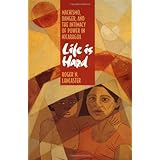
Average Reviews:

(More customer reviews)Are you looking to buy Life is Hard: Machismo, Danger, and the Intimacy of Power in Nicaragua (Centennial Book)? Here is the right place to find the great deals. we can offer discounts of up to 90% on Life is Hard: Machismo, Danger, and the Intimacy of Power in Nicaragua (Centennial Book). Check out the link below:
>> Click Here to See Compare Prices and Get the Best Offers
Life is Hard: Machismo, Danger, and the Intimacy of Power in Nicaragua (Centennial Book) ReviewWhen people want to know what everyday life in Nicaragua was like during what Eduardo Galeano has called "the time of beautiful madness," they invariably turn to Lancaster's book. Life is Hard gives an up-close, personal, and often poignant accounting of the experiences of three working-class families during the Sandinista period. But this accessible, engaging book is also more than a classic ethnography. The latter chapters (whose theoretical arguments ineluctably flow from the more descriptive chapters) provide a highly readable short course on much of what is most exciting in twentieth century cultural theory: semiotics, deconstruction, neomarxism, and the origins of queer theory.Over the course of the book, the author takes the reader through various vignettes, life stories, and analyses. At the same time, Lancaster reveals different facets of himself, in context-appropriate passages: socialist, Southern working-class origins, white, gay... The result is an implicit argument about how complex, compound, and contingent identities are. The result is also that alert readers get a very good sense of how the author's experiences shaped his research questions- and how they affected his interactions with Nicaraguan informants spanning a broad social gamut: single mothers, soldiers, adolescent boys and girls, "macho" men, and a number of gay men (clearly quoted, sometimes at length, in the chapter on same-sex relations).
Lancaster's overarching analysis is complex. In a feminist vein, he argues that the Sandinista revolution failed, in part, because its leadership failed to undertake an effective renovation of gender relations and family life. In a gay studies vein, the author shows how the everyday stigmatization of male same-sex relations regulates and supports conceptions of "appropriate" manhood (nobody wants to be called a "queer"!)-- and how, in no small part, it was this quotidian homophobia that undermined Sandinista efforts at changing family life.
The nuanced picture Lancaster draws of family life in a culture of machismo, and the innovative analysis he develops of how same-sex relations function in that culture, have been corroborated by a host of scholars working in different fields: Tomas Almaguer, Ana Alonso, Annick Prieuer, Don Kulick, David Whisnant, Richard Parker, and many others. With good reason, this important book received both the Society for the Study of Social Problems' C. Wright Mills Award, and the Society of Lesbian and Gay Anthropologists' Ruth Benedict Prize. I should add: this book has been used in several undergraduate and graduate courses I've taken. Invariably, students vote this the best-realized ethnography in the class.Life is Hard: Machismo, Danger, and the Intimacy of Power in Nicaragua (Centennial Book) Overview
Want to learn more information about Life is Hard: Machismo, Danger, and the Intimacy of Power in Nicaragua (Centennial Book)?
>> Click Here to See All Customer Reviews & Ratings Now
0 comments:
Post a Comment